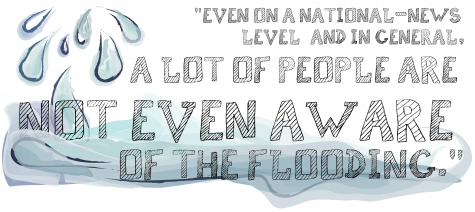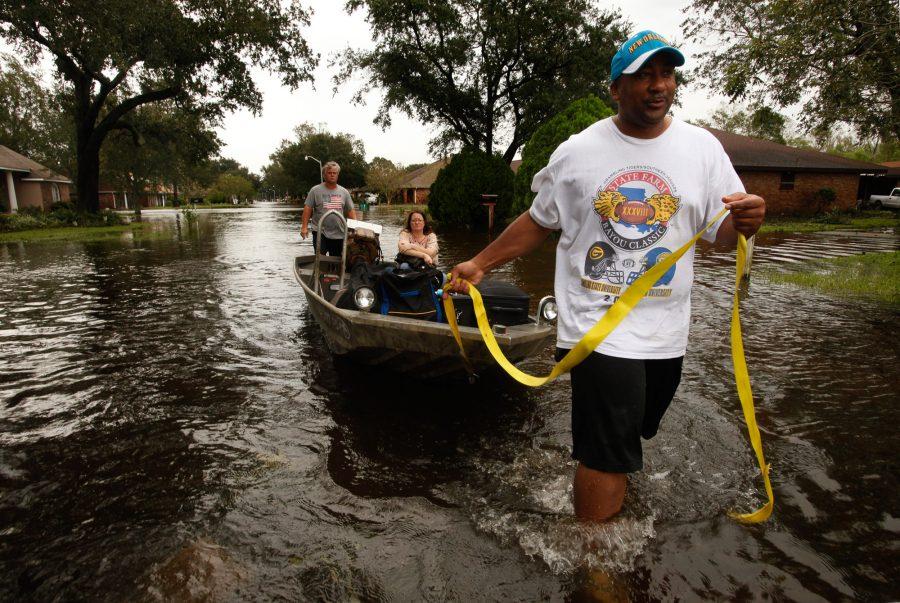Even miles away, Louisiana flooding affects campus community
Leroy Smith, right, helps evacuate Michele Bowers with Hank Schlindwein, back, in La Place, Louisiana, on Thursday, August 30, 2012, amid flooding from Tropical Storm Isaac. (Carolyn Cole/Los Angeles Times/MCT)
Aug 31, 2016
The recent mass flooding in Louisiana has made national headlines, yet still is not widely discussed on campus.
For Amal de Alwis, junior in Engineering, the mass flooding is not just a tragic news story. As a Louisiana resident, it is a reality.
“My hometown is actually pretty affected,” Alwis said. “My neighborhood, specifically, was more lucky, and we didn’t have any flooding. Tons and tons of my friends that are from the city and also surrounding areas — their homes got flooded and destroyed.”
On Aug. 14, President Obama declared the state of Louisiana in a state of federal disaster according to FEMA. Due to the massive rain and flooding, it was announced that flood victims in cities such as East Baton Rouge, Livingston, St. Helena and Tangipahoa could receive federal relief.
News or the Lack Thereof
Get The Daily Illini in your inbox!
While the flooding has devastated communities and affected many personally, Alwis said he was surprised to hear that his friends from the University have not heard very much about it.
“Even on a national-news level and in general, a lot of people are not even aware of the flooding,” he said.
Alwis said he had to explain to a friend just how devastating the flood is for residents of Louisiana.
Marcia Pool, a lecturer in Bioengineering on campus, is from Eros, a city in North Louisiana. Luckily, Pool has not been personally affected by the flooding. However, she has been following the coverage from individuals that have been impacted.
Pool said she hasn’t seen a lot of news coverage about the flooding, but she has seen a lot of Facebook posts from people in Louisiana.
“As far as the news covering the flooding, I heard a little bit about it when it first happened, and then I now really haven’t heard anything major about it,” Pool said. “It has affected a great deal of people, and some people have lost their whole homes.”
She did acknowledge that this coverage could be taking place in locations of which she is unaware.
Craig Richard, graduate student in Engineering, is from Hahnville, Louisiana. His town is located about 30 miles outside of New Orleans, near the Greater Baton Rouge area.
“I haven’t heard much news about the flooding around the UIUC campus or in the national media,” Richard said. “I mostly watched local (Louisiana) news coverage to learn what was happening. It took several days for the national media to even begin covering the disaster.”

Social Media
Alwis explained he receives a lot of his news and updates on the flooding through social media.
“Actually, what I see a lot on my Facebook newsfeed is people from Louisiana complaining about the flood not getting any sort of coverage in other parts of the country,” he said.
“It’s a lot more severe than people understand it to be,” Alwis said.“After coming up here for school, I stopped hearing more and more about it. The talk of the flood died down, and it’s sad to me.”
Richard explained he did not realize how bad the flooding was going to be until he saw the rainfall forecast and started seeing pictures on social media. He saw pictures of the flooding near Louisiana State University and near the Greater Baton Rouge area, as well as the activation of Facebook’s safety check system.
“My immediate family was not impacted by the flooding; however, I do have relatives whose homes flooded,” Richard said. “ I also know many people whose homes flooded including friends, classmates and faculty and staff from LSU.”
First Came Katrina
Alwis and both of his parents reside in Hammond, Louisiana, a smaller city about half an hour outside New Orleans. His father, professor at Southeastern Louisiana University, is unfortunately familiar with natural disaster.
In 2005, when Hurricane Katrina hit New Orleans, Alwis said his town experienced some of the damage. His city lost electricity for a week and experienced damage to houses, fences and trees. This occurred when he was just nine years old.
Alwis remembers driving through New Orleans the day after Hurricane Katrina hit and viewed the devastation. He explained the image of “half a hotel building and demolished buildings.”
“It was a very eye-opening experience,” he said.
The Flooding
Now, the flooding has affected similar areas of Louisiana. While other neighbors have experienced water damage, Alwis’ home has remained safe.
“It was very unexpected,” he said. “I have heard a lot of people consider this even more devastating, in a sense, than the hurricane because it affected a lot of parts that people weren’t expecting. Not everyone had flooding insurance.”
Alwis explained that many of his friends have been displaced from their homes and were forced to find different living arrangements. Evacuation into shelters after home water damage is another common story Alwis has heard.
Alwis recalled that around 20,000 people were evacuated into shelters and the numbers continue to grow.
Thirteen people have passed away in the flood, including a mutual friend of Alwis.
“They found her still strapped into her car, and the water was completely above,” he said.
The older population has also been majorly affected by the flooding.
“One of my friends from the city was telling me that he knew some elderly people whose houses started (flooding) so quickly that people had to break in and save them,” he said. “They had no way of escaping themselves.”
Richard explained that many people in the community have lost everything.
“In a lot of cases they were not required to have flood insurance as they did not live in areas that were thought to be at risk of flooding,” Richard said. “The flooding was caused by what is now being called a 1,000-year rain event.”
Safety precautions have been taken in Alwis’s neighborhood in order to protect residents, including curfews set for people to stay off the streets after a certain time.
Some high schools in Alwis’s area have been temporarily closed due to the safety concern the weather has posed. The local university postponed their starting date by a week. Alwis said that he felt his local university did a good job with outreach by ensuring students were safe and even offering to cover fees.
“The university set up a carpool system for students who now have trouble getting to campus because it is very much a commuter school.”
Outreach
Richard explained that organizations such as the Baton Rouge Food Bank have seen a substantially increased need for donations due to the loss of grocery stores and transportation.
“Other organizations are collecting items such as clothing, toiletries, school supplies, hygienic and cleaning supplies to assist people with rebuilding and efforts, while others are looking for volunteers,” Richard said. “There are many more organizations helping with the recovery effort.”
Alwis said the best way to help the flooding victims is to reach out to relief organizations as well as GoFundMe pages. His friend in Baton Rouge, a city greatly affected by the flooding, raised over $5,000 through a GoFundMe page.
“It’s important to look for those kinds of personal stories because it can really help somebody,” he said.
He said that he would like to see more outreach from other parts of the country. He also said that the South has done a good job of helping the flood victims.
“In the state, whether you know someone or not, gender or race or anything, everyone is just willing to help out everybody,” Alwis said. “It is something very rare to see.”







